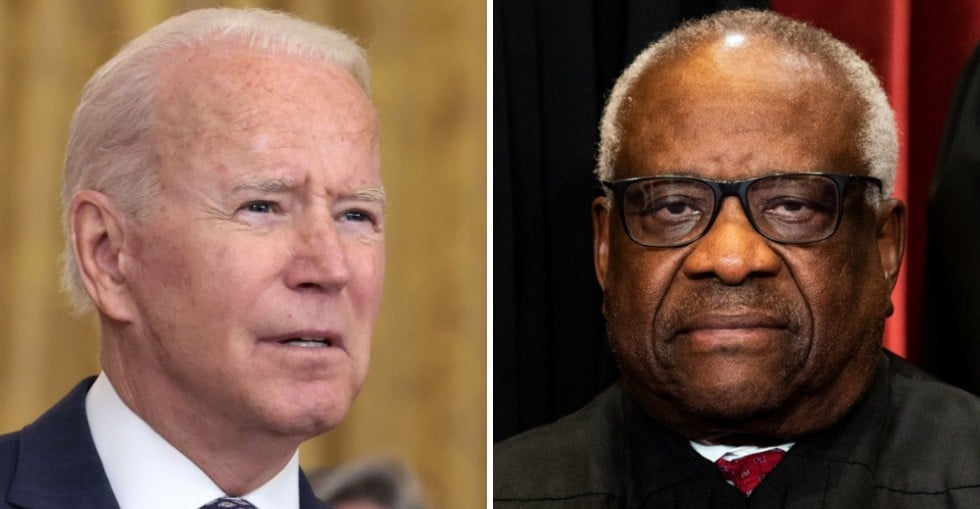OPINION: This article may contain commentary which reflects the author's opinion.
The U.S. Supreme Court recently heard arguments in two closely-watched immigration cases that could set major precedents.
In one case, United States v. Hansen, the justices heard oral arguments this week and appeared divided on the constitutionality of a federal law that bans “encouraging” immigrants to remain unlawfully in the United States violates the First Amendment’s guarantee of freedom of speech.
“The argument also sheds more light on the newer justices’ views on the freedom of speech. The newly reconfigured Court appears less strongly speech-protective than its recent predecessors — and perhaps interested in making big moves to constrain or even do away with the overbreadth doctrine. That doctrine allows a defendant to whom a law can be constitutionally applied to nonetheless challenge it as unconstitutional if the law makes a substantial amount of protected speech illegal, so that uncertainty about the scope of the law may chill protected speech,” SCOTUS Blog reported.
“The court’s questions focused on what protected speech might nonetheless be prohibited by the act. Justice Elena Kagan twice pressed Fletcher on if and why ordinary scenarios would be crimes — such as a friend or neighbor encouraging an immigrant to remain in the U.S., knowing full well that doing so would be unlawful,” the outlet added.
In the other case, the Biden administration was questioned over its assumed authority to decide which people in the country illegally they can deport first. A pair of Republican attorneys general from Texas and Louisiana argued that the U.S. Department of Homeland Security is violating federal immigration laws in doing so.
The nation’s highest court is considering a trio of issues distinct to the case and while it’s unclear which way the justices might swing, some did appear to chastise the Biden administration’s arguments.
“At the heart of the dispute is a September 2021 memo from Homeland Security Secretary Alejandro Mayorkas that laid out priorities for the arrest, detention, and deportation of certain non-citizens, reversing efforts by former President Donald Trump to increase deportations,” CNN reported in February. “Several of the conservative justices on Tuesday seemed ready to rule in favor of the states on a major threshold issue: whether Texas and Louisiana had the legal right to bring the challenge in the first place.”
In addressing whether the DHS guidelines were in conflict with two provisions of federal law, Justices John Roberts, Samuel Alito, and Brett Kavanaugh cited that the law does note some immigrants “shall” be taken into custody or removed from the country, which appeared to suggest they were skeptical of the Biden administration’s assumed discretion.
“Shall means shall,” Roberts said. “Shouldn’t we just say what we think the law is,” he added while suggesting it ought to be left to other branches to “sort that out.”
The case comes as the Biden administration has come under heavy fire for its lax immigration policies that have created what many have called a “crisis” on the U.S.-Mexico border.
Earlier this week, a new report revealed the number of convicted criminal illegal immigrants deported by Immigration and Customs Enforcement has dropped significantly under Biden.
New data reveals that ICE deported 150,000 in the fiscal year 2019 — under President Trump — but now is aiming to deport less than 30,000 a year.
Fox News reported:
In fiscal 2020, the last full year of the Trump administration, the agency aimed to deport 151,000 convicted criminal illegal immigrants and deported just over 100,000. In fiscal 2021, the target was 97,440 and just 39,149 were removed. By 2022, the first full fiscal year of the Biden administration, the target had dropped to 91,500 and just over 38,000 had been deported.
The agency has now lowered the targets for fiscal 2023 and 2024 to just 29,393 deportations for each year.
In an explanatory note, ICE said it is taking “every action possible to reduce factors that detract from removal performance, including constant efforts to obtain increased levels of cooperation from foreign countries and increasing the frequency of transport for detainees where possible.”
“However, it is important to note that significantly low removal numbers are more the result of environmental factors and policy environment than operational performance,” the statement continued, claiming criminal removals dipped because of COVID-19 but are now trending upward in the final quarter of fiscal 2023.
